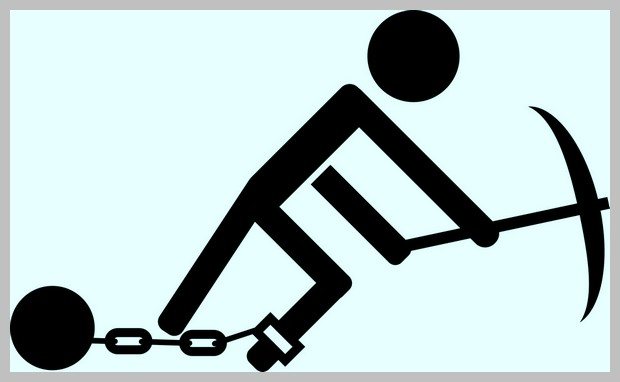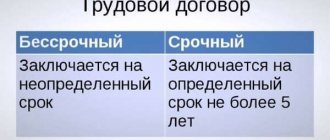The expanded concept of an employment contract is defined in Article 56 of the Labor Code of the Russian Federation, but, in short, an employment contract is an agreement between two parties (between the employer and the employee), concluded on the basis of the emergence of mutual rights and obligations. In accordance with this agreement, the employee assumes responsibilities for performing certain functions, strictly obeying the internal rules of the organization. In turn, the employer assumes the responsibility to provide the work specified in the employment contract, timely payment and necessary working conditions.
According to Art. 67 of the Labor Code of the Russian Federation, labor relations between employer and employee must be formalized in writing.
Rules for drawing up an employment contract
In labor legislation, there is no specific sample of an employment contract; however, regardless of its final form, the contract is concluded in writing and drawn up in two copies, each of which must be signed by both parties. Based on Art. 57 of the Labor Code of the Russian Federation, the clauses of the employment contract must contain:
- Name of the organization and full name of the employee between whom the contract is concluded.
- Place of work.
- Directly the type of work activity, position and type of work (main or part-time).
- Start date of work (in case of concluding a fixed-term employment contract, you must indicate the expiration date of the document).
- Rights and obligations of the employee and employer.
- Terms of payment (salary, tariff rate, additional payments, etc.).
- Work and rest schedule.
- Guarantees and compensations.
- Additional conditions, if any (existence and duration of a probationary period, business trips, part-time work, etc.).
Important! The absence of one of the above points in the employment contract determines the invalidity of the document and may be grounds for its cancellation or termination.
If the employment contract is drawn up incorrectly and the employee begins to perform the relevant functions on behalf of the employer, the contract is considered concluded and within 3 working days the contractual relationship must be formalized properly (Part 2 of Article 67 of the Labor Code). The beginning of the employment contract is considered to be the moment it is signed by the employee and the employer or from the date of actual commencement of work determined by the contract. If there is no start date in the contract, the employee is obliged to begin performing his duties on the next working day after the contract comes into force.
The employer has the right to cancel the employment contract unilaterally if the employee does not begin to perform functions on the day specified in the contract. on the basis of Art. 61 of the Labor Code of the Russian Federation, a canceled employment contract is considered not concluded.
Features of the employment contract
The conclusion of an employment contract always takes place in writing (in the near future it will also be possible to fill it out in electronic format). Thus, work based on an oral agreement is not considered an employment contract.
The document is filled out in two copies - one agreement per participant in labor relations. The employee and employer sign both documents.
To formalize an employment contract, a potential employee must provide his employer with the following documents:
Some of the documents, for example, an insurance policy, work record book and taxpayer number, must be prepared by the employer himself if the citizen whom they decide to hire is getting a job for the first time.
It is also possible that a new employee will work part-time, which means he will not be able to present his work record. In this case, he can bring a copy of it or limit himself to a certificate from his main workplace.
This list of documents is exhaustive; the employer has no right to demand the presentation of other documentation. However, the employer may ask to provide additional personal data about the citizen.
In turn, the employer, before concluding an employment contract, is also required to provide the future employee with certain documentation, including:
- Internal labor regulations. The future employee must not only familiarize himself with the document, but also sign as evidence of this;
- Collective agreement;
- Other existing local regulations that are directly related to the future activities of the employee within the framework of his position.
Important: all these steps must be completed before signing the employment contract!
Termination of an employment contract
An employment contract is a legal document, the conclusion, amendment or termination of which is carried out in writing in accordance with the requirements of the labor legislation of the Russian Federation. General grounds for termination of an employment contract are provided for in Article 77 of the Labor Code of the Russian Federation and include in the list:
- expiration of the contract;
- agreement of both parties;
- the employee's conscription/entry into military service;
- transfer of an employee to an elective position or to another organization;
- termination of an employment contract at the initiative of the employer (liquidation of the organization, reduction in staff numbers, inadequacy of the employee for the position held, or repeated gross violation of his duties without good reason);
- termination of an employment contract at the initiative of the employee (at his own request with written notification to the manager no later than 2 weeks before the planned date of dismissal);
- termination of the contract at the initiative of third parties (parents and guardians of minor citizens, trade unions, etc.);
- refusal of an employee to work under different working conditions or to be transferred to another location;
- pronouncement of a sentence or entry into force of a court decision on a sentence of imprisonment;
- other grounds and conditions.
Termination of an employment contract concluded for a part-time job occurs for the same reasons as for the main place of work, and has one additional basis - in the case of hiring an employee for this position for whom this place of work will be the main one.
How to draw up an employment contract?
It is necessary to take into account some points in order to correctly draw up an employment contract. The text of the document must include the following points:
- Information about the employee and employer: full name, name of organization, etc.;
- Details of documents of both parties;
- TIN of a legal entity or individual entrepreneur;
- Information about the person who signs the document on the part of the employer, as well as an indication of the grounds according to which the signing party is vested with such powers;
- Information about the contract itself: place and date of conclusion.
It is also necessary to clearly state the following terms of the employment contract:
- Place of work (if an employee gets a job at a branch or representative office, you must also provide information about the head office);
- List of official duties of the employee;
- Start date of official cooperation;
- Terms of remuneration (including possible allowances and bonuses);
- Working hours indicating time for rest (provided that there is a non-standard work schedule);
- An indication of the compensation due for difficult working conditions or work with hazardous substances;
- Information on compulsory social insurance;
- Responsibilities of the future employee and his employer.
Termination of an employment contract
The dismissal of an employee from his position is the termination of the employment contract concluded between the employee and the employer at the initiative of one of the parties. The employee has the right to terminate the employment contract
, notifying the employer about this in writing no later than two weeks in advance, unless a different period is established by this Code or other federal law.
Dismissal or termination of an employment contract is a voluntary termination of employment relations on the initiative of one of the parties to the employment contract or on the initiative of certain bodies that have the right to demand this termination. (not to be confused with termination of an employment contract, which means the end of the employment relationship between the employee and the employer).
Grounds for termination of an employment contract
The general grounds for termination of employment contracts are indicated in Art. 77 of the Labor Code of the Russian Federation, and in the case of the employee’s initiative, taking into account Art. 80 Labor Code of the Russian Federation.
The general procedure and the right itself are enshrined in Article 77 of the Labor Code of the Russian Federation, namely:
- agreement of the parties (Article 78);
- expiration of the employment contract (Article 79), except for cases where the employment relationship actually continues and neither party has demanded its termination;
- termination of an employment contract at the initiative of the employee (Article 80);
- termination of an employment contract at the initiative of the employer (Articles 71 and 81);
- transfer of an employee, at his request or with his consent, to work for another employer or transfer to an elective job (position);
- refusal of an employee to continue working in connection with a change in the owner of the organization’s property, a change in the jurisdiction (subordination) of the organization or its reorganization (Article 75), etc.
Notice of termination of a fixed-term employment contract
Proper execution of a notice of termination of an employment contract is extremely important to minimize the company’s possible legal risks.
The employee must be notified no later than three calendar days before the date of termination of the employment relationship (Part 1 of Article 79 of the Labor Code of the Russian Federation).
There may be exceptions to this rule, taking into account the labor function of a temporary worker:
- if the contract was signed to replace a temporarily absent employee (sick leave, maternity leave, etc. - Part 1 of Article 79 of the Labor Code of the Russian Federation), then it terminates when the main absent employee returns to work (Part 3 of Art. 79 of the Labor Code of the Russian Federation);
- if the contract was signed to perform a predetermined functionality (for example, a project), then it terminates when the functionality is completed (Part 2 of Article 79 of the Labor Code of the Russian Federation);
- similarly to the previous paragraph, the expiration time of the employment contract is also determined for seasonal work (Part 4 of Article 79 of the Labor Code of the Russian Federation).
The form of notice of termination of an employment contract is not established by law, so the company can do this using an independently developed sample. The termination of the employment relationship must be notified either by the head of the company or by an employee whom he has authorized to do so (for example, the head of the human resources department or simply a human resources inspector).
The procedure for termination on initiative is enshrined in Article 80 of the Labor Code of the Russian Federation
Does the article define how an employment contract (ET) is terminated? What documents are needed to terminate an employment contract when writing a letter of resignation at your own request?
- An employee has the right to terminate an employment contract by notifying the employer in writing no later than two weeks in advance, unless a different period is established by this Code or other federal law. The specified period begins the next day after the employer receives the employee’s resignation letter.
- By agreement between the employee and the employer, the employment contract can be terminated even before the expiration of the notice period for dismissal.
- In cases where the employee’s application for dismissal on his initiative (at his own request) is due to the impossibility of continuing his work (enrollment in an educational organization, retirement and other cases), as well as in cases of established violation by the employer of labor legislation and other regulatory legal acts, containing labor law norms, local regulations, terms of a collective agreement, agreement or employment contract, the employer is obliged to terminate the employment contract within the period specified in the employee’s application.
- After the expiration of the notice period for dismissal, the employee has the right to withdraw his application at any time. Dismissal in this case is not carried out unless another employee is invited in his place in writing, who, in accordance with this Code and other federal laws, cannot be denied an employment contract.
- Upon expiration of the notice period for dismissal, the employee has the right to stop working. On the last day of work, the employer is obliged to issue the employee a work book and other documents related to the work, upon the employee’s written application, and make a final payment to him.
- If, upon expiration of the notice period for dismissal, the employment contract has not been terminated and the employee does not insist on dismissal, then the employment contract continues.
Termination does not relieve the employee from financial liability.
If an employee of an organization, under an employment contract, had a traveling nature of work, as a result of which he was given funds in advance on account, he must provide reports on their expenditure upon dismissal. All money for which the employee was unable to account is considered damage caused to the employer and must be compensated in full.
Violation of an employment contract
Violation of the terms of a document regulating labor relations can lead to serious consequences, including criminal liability.

When the violator is an employee
The most common violations committed by employees include:
- Failure to fulfill one's immediate professional duties;
- Allowing gross violations in the performance of one’s duties, including:
- Absenteeism;
- Working under the influence of alcohol or drugs;
- Disclosure of secrets that the employee learned in the course of his work activity. We are talking about both commercial or official secrets and state secrets;
- Illegal transfer of personal data of your colleagues;
- Theft of work property, its damage (intentional), etc.;
- Ignoring labor safety rules, which entails the risk of an accident;
- Amoral behavior;
- Actions (often directly related to the material side) that led to a loss of confidence in the employee;
- Providing false information about yourself or false documents when applying for a job.
Any of the above grounds entails dismissal under an employment contract
Violations committed by management
In practice, there are much more violations committed by employers. They depend on the specifics of the enterprise and many other factors. We give the most common examples:
- Punishment (in the form of fines, deprivation of bonuses, etc.) of an employee for the latter’s refusal to perform work that is not part of his job duties;
- Delay of wage payments;
- Creation of irregular working hours (when this is not provided for by the terms of the contract);
- Refusal to provide an employee with legal paid leave;
- Deprivation of a position in the absence of objective reasons;
- Violation of labor safety conditions and regulations;
- Refusal to pay legal compensation.
Responsibility for violation of labor laws
Unscrupulous employers may bear the following liability for violation of an employment contract:
- Civil penalties:
- Payment to an illegally dismissed or suspended employee of previously unpaid wages;
- Payment to an employee of lost wages and compensation for expenses incurred by the latter due to injury or damage to health.
- Disciplinary punishment;
- Administrative punishment:
- Unjustified dismissal of an employee;
- Violation of safety requirements and working conditions.
- Criminal penalty:
- Violation of labor protection requirements;
- Failure to pay an employee the money he earned.
Criminal punishment applies exclusively to an official, that is, a citizen, and cannot extend to an organization.
Employee rights upon termination of employment obligations
The procedure for formalizing the termination of an employment contract gives the employee the right to terminate the contract on his own initiative, and the employer’s consent is not required. In this case, the corresponding application must be submitted two weeks before the expected date of dismissal. The employee retains the right to withdraw his application within this period. But, if the dismissal occurs by agreement of the parties, he will not have such an opportunity.
To terminate a fixed-term contract, or quit during the probationary period, you can notify the employer three days before the expiration of the term.
The contract may be terminated at any time specified by the employee if the work cannot be continued in conditions of violation of the terms of the employment agreement, collective agreement or labor law.
Also, when dismissing by agreement of the parties, the employee can indicate a dismissal date convenient for him, since the deadline for filing an application is not established by law for this form of termination of employment relations.
Author of the article
↑ Labor relations: participants, their rights and obligations.
Labor relations
are relationships based on an agreement between an employee and an employer on the employee’s personal performance for payment of a labor function (work in a certain specialty, qualification or position), the employee’s subordination to internal labor regulations while the employer provides working conditions provided for by labor legislation, a collective agreement, agreements, employment contracts.
Participants in labor relations
are
- worker,
- employer,
- employee organization (trade union)
.
Parties to labor relations, their rights and obligations
The parties to labor relations are
the employee
and
the employer.
Worker
- an individual who has entered into an employment relationship with an employer, i.e. an individual working under an employment contract with the employer and receiving wages for this.
Employer
- an individual or legal entity (organization) that has entered into an employment relationship with an employee. An individual may be an owner, an entrepreneur or another person authorized by the owner to represent him in labor relations.
The employee has the right
- to conclude, amend and terminate an employment contract;
- providing him with work stipulated by the employment contract.
- compliance of the workplace with labor protection requirements.
- for timely and full payment of wages in accordance with their qualifications, complexity of work, quantity and quality of work performed.
- for rest provided by the establishment of normal working hours;
- complete reliable information about working conditions;
- professional training, retraining and advanced training, etc.
The employee is obliged
- conscientiously perform their labor functions;
- comply with internal labor regulations and labor discipline;
- comply with established labor standards;
- comply with occupational health and safety requirements.
- treat the property of the employer and other employees with care, and immediately notify the employer or immediate supervisor of the occurrence of a situation that poses a threat to the life and health of people, or the safety of property.
The employer has the right
- conclude, amend and terminate employment contracts with employees;
- conduct collective negotiations and conclude collective agreements;
- reward employees for conscientious, effective work.
- require employees to perform their job duties and take care of their property and that of other employees, and to comply with internal labor regulations;
- bring employees to disciplinary and financial liability in the manner established by the Labor Code of the Russian Federation, other federal laws, etc.
The employer is obliged
- comply with labor laws;
- provide employees with work stipulated by the employment contract.
- ensure safety and working conditions that comply with state regulatory requirements for labor protection.
- provide workers with equal pay for work of equal value;
- pay employees wages in full on time;
- provide for the everyday needs of employees related to the performance of their job duties.
- carry out compulsory social insurance of employees.
- compensate for harm caused to employees in connection with the performance of their labor duties, as well as compensate for moral damage in the manner prescribed by law.
Types of employment contracts
In addition to the duration of the work, contracts also differ depending on the nature of the cooperation:
- At the main place of work;
- At the same time;
- About temporary work (when the work will take no more than 2 months);
- About seasonal work;
- About working from home;
- On state or city service (concluded in the form of a contract).
The following type is by employer category:
- When the employer is a legal entity;
- When an individual is hired to work.
Another type of document is based on the specific legal status of the employee:
- With a minor employee;
- With citizens with family responsibilities;
- With citizens of other countries.
Duration of the employment contract
Based on the nature of the duration of the employment relationship, two types of documents are distinguished:
- Indefinite - in this case, the document will expire simultaneously with its termination;
- A fixed-term employment contract that cannot be concluded for a period longer than 5 years.
Fixed-term employment contract
This document is relevant for employment relationships that cannot be concluded on a permanent basis (seasonal work, temporary work, etc.). Its only difference from an open-ended employment contract is that in the field where the start date of the work is indicated, the day of its completion is immediately entered.
If the document has expired, while the employee continues to perform his duties, and none of the parties to the contract has demanded its termination, then the document automatically becomes an open-ended document, and the provision on the termination of the employment relationship simply loses its force.
Change of employment contract
Both parties to the employment relationship have the right at any time to make adjustments to the text of the document that relate to:
- Transfer to another job;
- Adjustments to existing conditions;
- New owner of company property or reorganization of the company;
- Removal from work duties.
The employer can unilaterally make changes to the text of the employment contract only if, due to external changes, maintaining the previous conditions is impossible (for example, reorganization of the company, introduction of new work technology, etc.).

Under other circumstances, management will have to agree on all adjustments with the employee. To do this, you must sign an additional agreement to the employment contract.
The employer must also remember that in situations where he intends to adjust the current employment contract, the employee must be notified 2 months before the changes are implemented.
Such a notice is drawn up in writing and given to the employee against signature, after which one copy must remain with him, and the second copy must be kept by the employer.








